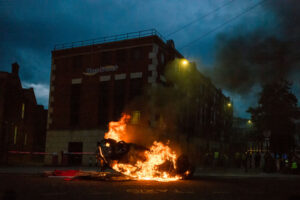It wasn’t meant to be like this. This was meant to be a victory lap during a honeymoon period on the banks of Liverpool’s River Mersey. It was meant to be Things Can Only Get Better, but it has the feel of a knacker’s yard — a tired, end-of-term government mired in sleaze and briefing wars after just two months in office. The vibes are well and truly off at the Labour conference.
Keir Starmer’s speech tried to strike a positive note after weeks of talk about black holes and “difficult choices”. Instead we heard about the “politics of national renewal” and “a country with its future back”. The hall lapped it up, of course. But outside you feel it will fall on deaf ears, save for an unfortunate mispronunciation that saw the Prime Minister call for “the return of the sausages”.
We’ve been explicitly warned that, contrary to D:Ream’s lyric, things will only get worse. And yet delegates are still trying to make the most of it inside the conference complex, a slick product of urban “regeneration” on the Merseyside docklands, a place that feels cut off from the city proper. Outside the bubble of the secure zone, it’s hard to find anyone normal who even knows the conference is taking place.
“Labour used to be different than it is now,” says Graham, a retired firefighter, shielding from the rain. He’s not wrong. It’s a bumper year for the corporate lobbyists, even as the unwritten rule of omertà on Westminster perks has been broken. Previously, the fact that everyone had their snouts in the freebies trough was enough to ensure that opposition MPs and journalists wouldn’t make too much of a fuss when ministers got tickets to the football.
It’s clear Labour has no shortage of benefactors. Conference itself is one big, sponsored jamboree for Twitter-addicted politicos being plied with hospitality from whichever corporate “government relations” department has too much budget. But, juxtaposed with cuts to winter fuel payments and promises of blood, sweat and tears, the sight of the new crowd in donated designer gear is particularly grating. That is doubly so when Keir Starmer made a virtue out of his holier-than-thou, lawyerly aesthetic, distinguishing himself against the cavalier profligacy of Boris, or the air of tech-bro entitlement surrounding Sunak.
A group of pensioners are protesting next to a Ferris wheel, more-or-less the closest they can get to the main buildings. “Labour have come up against the pressure of the establishment to not do anything radical,” says Dave, a retired IT man, not impressed with losing his £200-per-annum energy subsidy. He’s in a huddle carrying flags for Unite, the most vocally militant of the Labour-affiliated unions. “There’s no point getting a Labour government in to do the same as the Tories did.”
“They’re all the same” is a crude summation, but one widely held outside of political circles. The truth is that the last election was a choice between two subtly distinct tribes from the adjacent worlds of public-private-third sector managerialism. One is more likely to have read Hayek, or to be seen at the drinks receptions of the Institute for Economic Affairs or the Centre for Policy Studies in Birmingham next week; the other might read Mazzucato, and clink glasses at the Institute for Public Policy Research or the Resolution Foundation — feeder-group think tanks for the policy and personnel of the parliamentary Labour Party.
This is Mecca for that strange nexus of the public affairs-wonk-Whitehall world, drunk on warm booze, and high off proximity to the dullest form of power. It’s a world of lanyards, laptops, stale sandwiches and Marks & Spencer cuts for people who get excited when they see Laura Kuenssberg, and who name-drop their MP acquaintances to anyone who will listen. They walk hurriedly between drinks events, always held “in partnership” with a generous private outfit and their lobbying team, jabbing at phone screens with furrowed brows.
Inside the conference, stands for Google, Barclays and HSBC sit awkwardly alongside the trade union old guard and remnants of the activist Left. The latter look slightly anachronistic in Starmer’s Labour Party. Labour has gone from having big names like Nye Bevan (coal miner, trade union official, councillor, MP) to big names like Torsten Bell (PPE at Oxford, political adviser, think tanker, MP).
Someone working in conference services has had their fun at least: the stall distributing the Morning Star, the old rag of the socialist Left, sits six feet opposite from Labour Friends of Israel; the Cuba Solidarity Campaign shares a cramped space next to an escalator with Labour Friends of the Armed Forces. All this is indicative of what could charitably be called Labour’s “broad church”. More cynically, it could be called an incoherent mess of contradictory worldviews. That is Labour’s internal politics: never-ending battles for the soul of the party, permanent factional war because of a first-past-the-post system that won’t allow amicable divorce.
Starmer’s electoral bond with the British public was always skin deep — a marriage of convenience rather than one of love. Fourteen years of stagnant wages, followed by the embarrassments of Partygate and Liz Truss, meant that the Labour leader only had to appear as the unthreatening, not-Tory option. Nobody mistook the Prime Minister’s pained, nasal consultancy-speak for raw charisma or inspirational vision. And few were inspired by a manifesto that accurately diagnosed Britain’s relative decline, but came up short on adequate solutions. There was nothing in yesterday’s keynote address that we hadn’t heard before.
One group that thinks it has the answers are the Yimbies at the Yimby Rally. Low growth? The housing crisis? The energy transition? For this terminally online subculture, there are few problems that planning reform can’t solve. In the “Imagine Room”, a Californian, Nolan Gray, tries to do some panto-style call-and-response to a crowd that just wants to chit-chat about the Town and Country Planning Act. Do people realise how weird this is? Over the hubbub, Chris Curtis, the YouGov pollster-turned-MP for Milton Keynes, is hailing 2024 as “a year of change, a year where we have turned the tide on those who have tried to block building”.
There’s nothing wrong, of course, with making it easier, faster and cheaper to build homes, railway lines and electricity pylons. But when faced with the abject state of a collapsed public realm, the steady death of the UK’s industrial base, and yawning gaps between the dynamic economy of the metropole compared with the rest of the country, there’s a grand divergence between the deep, structural imbalances at play and the proposed solutions. They seem to have bet the house on planning-as-panacea.
There are elements of Labour’s programme from which the Left could take heart. Nationalised rail, a public energy company, some new employment rights. And yet these won’t satiate a restless public for whom cynicism has become the default position. Talk about expediting planning applications or industrial strategy councils may excite the faithful, but it has little cut-through in the real world.
To be sure, the new occupants of Downing Street have a grim inheritance. The era of negative real interest rates is over. Servicing public debt is costing the taxpayer almost as much as the education budget. The ambitious programmes of public ownership and fiscal stimulus that the party’s Left flank craves had an inner logic when money was cheap. In the post-Covid world, with the Bank of England keeping rates stubbornly high, fiscal constraints are very real.
The country has seen more than a decade of flatlining productivity. We’ve had a once-in-a-generation energy crisis. Just since Labour entered office, job losses have been announced in a host of old industrial clusters: Tata Steel in Port Talbot, Harland and Wolff in Belfast, and Grangemouth oil refinery. The government came to power talking a language of the activist state, a “post-neoliberal” political economy more sceptical of globalisation, and more eager to intervene in markets.
But this kind of “Bidenomics” paradigm (the Chancellor Rachel Reeves prefers “securonomics”) lacks heft without significantly higher investment. The Government is spooked by the power of bond markets, wary of appearing too Truss-like — or, God forbid, too Corbynite. There’s an air of Philip Snowden about Reeves: the first Labour Chancellor, a Christian socialist, took office in 1924, only to recommit even more forcefully than the Conservatives to balanced budgets, “sound money” and the gold standard.
Much hinges on growth. The Prime Minister spoke of this core aim (or is it a hope?) as “light at the end of the tunnel”. But Reeves’s first budget next month will be a defining moment, confirming whether the Chancellor can tinker with her fiscal rules enough to manoeuvre herself out of Britain’s cul-de-sac, the endless cycle of raided capital budgets and false economies coming home to roost.
“My mates and me are all quite strong about the illegal immigrant thing,” Graham, the retired firefighter, tells me. Just six weeks ago, a few yards away from the conference centre, a large anti-migrant demonstration turned violent in the wake of the Southport murders. Alongside the traditional far-Right, the riots were spurred on by a strange, diffuse band of online wellness advocates, anti-vax fitness gurus, CBD salesmen and conspiratorial Instagram influencers. Outside the conference centre, there’s as much cut-through of those bizarre imaginaries as there is of any “Labour Yimby” programme. Starmer might want to talk about “partnerships”, “missions” and public service reform, but few are listening. If the Government fails to deliver, things could get much, much worse. We can’t say we weren’t warned.
Disclaimer
Some of the posts we share are controversial and we do not necessarily agree with them in the whole extend. Sometimes we agree with the content or part of it but we do not agree with the narration or language. Nevertheless we find them somehow interesting, valuable and/or informative or we share them, because we strongly believe in freedom of speech, free press and journalism. We strongly encourage you to have a critical approach to all the content, do your own research and analysis to build your own opinion.
We would be glad to have your feedback.
Source: UnHerd Read the original article here: https://unherd.com/




